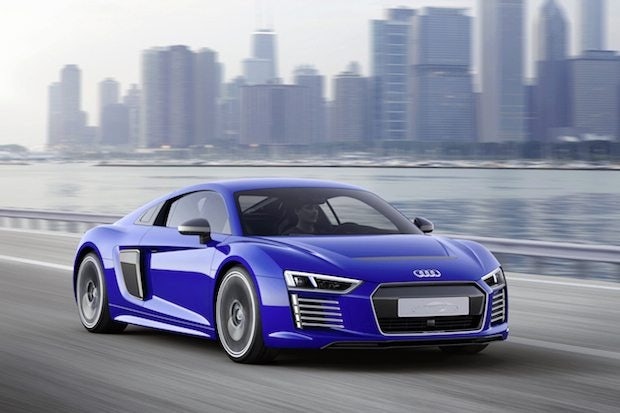
The Audi R8 e-tron. (Courtesy Image)
From “smart” homes and automobiles to fashion and jewelry, the global luxury industry is navigating an unprecedented time of high-tech development. With an exceptionally digitally savvy consumer base and fast adoption of new technology, China serves as a prime market for high-end brands as they reach a new industry frontier.
Spurred on by the game-changing launch of the Apple Watch, brands across the luxury spectrum are joining in on a global technology revolution. From Ralph Lauren’s “smart” bag that charges mobile phones to Tag Heuer’s collaboration with Google for an Android smartwatch, many labels have not shied away from incorporating “smart” elements into their new products. The possibility for a collaborations with luxury is causing a growing number of tech brands to take a newfound interest in the sphere—for example, Silicon Valley recently had its first ever fashion week.
As brands wade into the smart luxury sphere, the key consumer market they’re eyeing is China thanks not only to Chinese consumers’ love for luxury, but also to their openness to new trends and willingness to embrace the latest technology.
Since state-of-the-art features have long been a cornerstone of the luxury car industry, high-end auto brands have readily latched onto smart technology in China. In April this year at the Shanghai Auto Show, British luxury car brand Aston Martin announced that it is teaming up with Chinese entertainment company LeTV to develop smart auto systems and in-car entertainment. Speaking about the deal at the time, Aston Martin CEO Andy Palmer told The Wall Street Journal that “there are some things, particularly in the technology space, where China is moving very quickly.”
As Geely-owned Volvo builds up its own luxury image in China, the company has announced that its XC90 set for its upcoming China debut two weeks from now will be “an IoV (Internet of Vehicles) car model that people have long dreamed of,” said Geely CEO Li Shufu, “as it's the world's first vehicle boasting a highly automated driving function, not to mention its large tablet-style center touchscreen."
Ever since Google’s development of a self-driving smart car, luxury auto brands have been particularly focused on developing self-driving technology, and China is considered to be a key market. At the Consumer Electronics Show in Shanghai in May, Audi unveiled its R8 e-tron concept supercar, which employ sensors, laser scanners, and video cameras to drive itself. At the show, Audi also announced a partnership with Chinese tech company Huawei to create an internet-enabled driving experience for the Audi Q7 SUV in combination with Baidu’s CarLife technology. Meanwhile, e-commerce giant Alibaba has raised US$160 million to build smart vehicles with Chinese auto brand SAIC, while Tencent is teaming up with Foxconn and Harmony Auto to develop its own smart car.
Smart homes are another major area of tech development for brands in China. In May, Chinese real estate developer Huayuan Group entered a partnership with Chinese security software and internet search company Qihoo 360 Technology to create smart security routers, location- and health-tracking wearables, electrical appliance safety alarms, intelligent gas and fire alarms, and more. Meanwhile, on the more affordable end of the spectrum, electronics brand Xiaomi is slowly building up a smart home ecosystem with a line of smart devices including air filters and in-home entertainment that can be controlled via a mobile app.
Integrated into these technologies is the advent of wearable tech, which can range from the practical—such as items like a blood-pressure monitor device from Xiaomi connected to its smart home system—to the high-fashion concept exhibited by Apple Watch’s luxury model. Apple, which was named China’s top “luxury” gifting brand this year by the Hurun Report, and its competitors are focused squarely on the China market when it comes to wearable tech. Chinese brands are rapidly rushing to compete with the Apple Watch: Huawei unveiled a round-face fashion smartwatch in March with an emphasis on the piece’s identity as a “luxury” model. China is also a priority for foreign companies creating Apple Watch competitors: Swatch recently inked a deal with China UnionPay for its own smartwatch in development.
From cars to wearables, the focus on China for “smart” technology in the luxury sphere is likely due in equal parts to Chinese consumers’ insatiable appetite for luxury as well as their interest in new technology—especially mobile. A survey released in June by RBC Capital Markets found that 79 percent of Chinese luxury consumers said they want to buy a smartwatch, and 14 percent had already bought one.
While luxury sectors such as home goods and cars go hand-in-hand with the development of smart technology, others such as fashion and jewelry are facing an identity crisis as they mull the decision of whether or not they should resist or join luxury’s high-tech revolution. The key for luxury brands looking ahead to the future will be to preserve the aspects of their brand DNA that resonate with Chinese consumers while adapting to Chinese shoppers’ intense enthusiasm for the latest trends and technology.